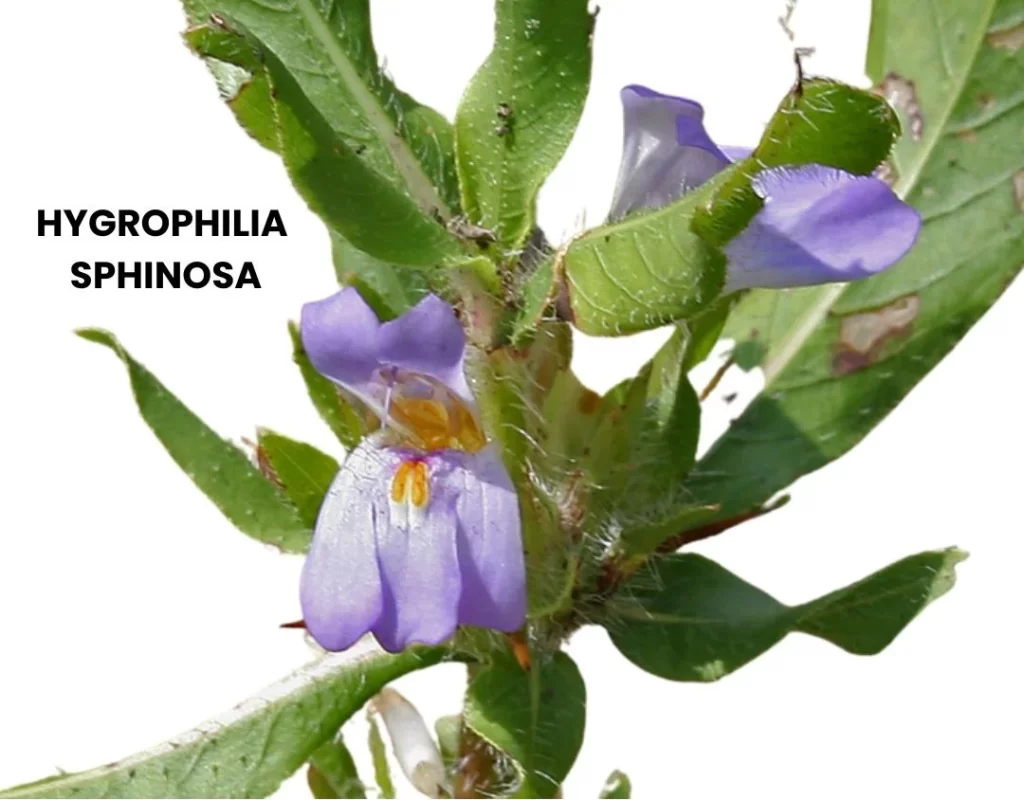Hygrophila spinosa, known as Kule Khara, is a medicinal plant widely used in traditional medicine for treating a variety of ailments, particularly those related to the urinary system and skin.
It belongs to the Acanthaceae family and is renowned for its diuretic, anti-inflammatory, and hepatoprotective properties.

Table of Contents
ToggleSOURCE INFORMATION
Common Names: Ikshugandha, Kokilaksha, Talmakhana, Gokshura, Tolimkhana, Nirguviveru, Gokhulajanum
Scientific Classification
- Kingdom: Plantae
- Clade: Angiosperms
- Clade: Eudicots
- Order: Lamiales
- Family: Acanthaceae
- Genus: Hygrophila
- Species: H. spinosa
Origin and Historical Facts
- Hygrophila spinosa is native to India and other parts of Southeast Asia.
- It has been used in Ayurveda for centuries to treat conditions such as dropsy, gonorrhea, insomnia, and rheumatism.
- The plant’s various common names reflect its widespread use and importance in different cultures.
- It is especially valued for its ability to support urinary health and alleviate skin problems.
DRUG PATHOGENESIS
- Hygrophila spinosa contains several active constituents, including alkaloids, flavonoids, and saponins.
- These compounds contribute to its therapeutic effects, such as diuresis (promoting urine production), anti-inflammation, and hepatoprotection (protecting the liver).
KEY CHARACTERISTICS
- Diuretic: Helps increase urine output.
- Anti-inflammatory: Reduces inflammation in the body.
- Hepatoprotective: Protects and supports liver function.
DETAILED ORGAN SYMPTOMS
SKIN
- Skin Troubles: Conditions worsen with heat and improve with cold. Effective for treating various skin disorders, particularly those accompanied by itching.
FEVER
- Malaria-Associated Fever: Fever associated with urticaria (hives). Intense itching occurs with the rise in temperature, which is relieved by cold applications. Fever typically appears in the morning without chills or thirst.
URINARY SYSTEM
- Urinary Troubles: Useful in treating urinary infections, calculus (kidney stones), and related discomforts. Promotes healthy urinary function.
- Anasarca and Dropsy: Helps in conditions of generalized body swelling due to fluid retention.
REPRODUCTIVE SYSTEM
- Gonorrhoea and Leucorrhoea: Effective in treating sexually transmitted infections and abnormal vaginal discharges.
- Impotency: Helps in conditions of sexual weakness or impotence.
NERVOUS SYSTEM
- Insomnia: Useful for treating sleeplessness and promoting better sleep quality.
RHEUMATISM
- Rheumatic Conditions: Alleviates pain and inflammation associated with rheumatism.
MODALITIES
- Aggravation: Symptoms worsen with heat.
- Amelioration: Symptoms improve with cold applications.
WHAT ARE MODALITIES IN HOMOEOPATHY?
RELATIONSHIP WITH OTHER DRUGS
- Complementary: Works well with other diuretics and hepatoprotective remedies.
DOSE
- Mother Tincture: For general use and acute symptoms.
- 3x, 6x, and 30: Used for chronic conditions and specific symptomatology.
Frequently Asked Questions
What is Hygrophila spinosa used for?
- Hygrophila spinosa is used for treating urinary troubles, skin diseases, rheumatism, gonorrhoea, insomnia, and conditions like dropsy and anasarca.
How does Hygrophila spinosa help in urinary conditions?
- It acts as a diuretic, promoting urine production and alleviating symptoms of urinary infections and kidney stones.
Can Hygrophila spinosa be used for skin problems?
- Yes, it is effective for various skin conditions, especially those that worsen with heat and improve with cold.
What are the side effects of Hygrophila spinosa?
- Generally, it is well-tolerated, but in rare cases, it may cause mild gastrointestinal disturbances or allergic reactions.
What is the recommended dosage for chronic conditions?
- For chronic conditions, potencies of 3x, 6x, and 30 are recommended, depending on the severity and specific symptoms.
Glossary of Difficult Words
- Anasarca: Severe, generalized oedema (swelling) throughout the body.
- Diuretic: A substance that promotes the increased production of urine.
- Hepatoprotective: A substance that protects the liver.
- Impotency: Sexual dysfunction characterized by the inability to achieve or maintain an erection.
- Leucorrhoea: A white or yellowish vaginal discharge.
- Rheumatism: A condition characterized by inflammation and pain in the joints, muscles, or fibrous tissue.
- Urticaria: Hives; a skin rash characterized by red, itchy welts.
This detailed drug picture provides a comprehensive overview of Hygrophila spinosa, its medicinal properties, and therapeutic applications.
If you have any further questions or need additional information, feel free to ask!
